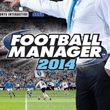Football Manager 2014: General advice

1. Choosing a club
There are no difficulty settings in Football Manager 2014 so you can control it by choosing a right club. For beginners that want to learn the game's mechanics, a strong club from a high league will be a good choice. Million-euro transfers and European cups will be at your fingertips. Then you can choose a weaker team and start its career from the bottom. The rule is simple: the weaker your team is, the harder it is to get somewhere, but the satisfaction of winning the Champions League will be much bigger with a minor team than, for example, Bayern Munich.
2. Choosing a team
Regardless of the club you pick, remember to have a right number of players in your team. Having a substitute goalkeeper and, based on your needs and strategy, other substitute players is essential. Remember to pay attention to the players' form. Don't use the same eleven players all the time, give a chance to your substitutes too. Your main players will have some rest and the substitutes will gain experience. Perhaps you'll notice that someone deserves to be included in the first team.
3. Choosing a strategy
Strategy is essential. Try to have two or three of them that your players are good at. Experiment - a specific strategy might be effective against several enemies and completely ineffective against others. Don't overdo things. It's not a good idea to change the strategy after every lost match. And the other way around - if you keep losing, don't expect things to change.
4. Substitute's bench
Make sure there's enough substitutes before every match. You should always have a substitute goalkeeper. They rarely get injuries and red cards, but when it happens, it's a good idea to have a substitute. Doing that, you'll avoid, for example, moving a striker to goalkeeper's position. Then choose the rest of the players based on your strategy. For example, when you play with 4-5-1 formation, don't take three substitute strikers, it's a better idea to have more midfielders. Don't overwork your players. A good substitute's bench is important to be able to respond to any situation and pick the right player.
5. React to in-game situations
You're the favorite and you're losing on your own ground? Move your formation to attack and try to catch up. You have 1 goal advantage fifteen minutes before the end of an away match? Move your players to defence and stay on your side. Your player is tired? Substitute him! Flexibility and paying attention to what happens at the pitch is the key to winning.
6. Take a look at players without contracts
After you start the game (also during the game) you should check the players who don't have contracts. They can be useful for clubs that don't have multi-million transfer budgets, you can often find valuable players that will easily make it to your first team. The best way to do it is to narrow down your searching to the attributes you're interested in. Doing that, you'll immediately see the profiles of players with characteristics you desire.
7. Experiment during friendly matches
Organizing friendly matches is a very important thing, especially between rounds. It's a great way to test all your team, including players that didn't have many opportunities to play during the season. It's a good idea to set up matches against your substitutes and see which players are the best. Moreover, friendly matches are a good source of income for minor teams.
8. Count on the young ones
Acquiring and training young, talented players is very important part of long-term vision of building a team. These young players may become stars of their teams or even Europe after a few seasons of proper training. It will strengthen your team. Moreover, selling these players can give you quite a lot of money. It's a good idea to take a look at the list of young talents and many other players, depending on the leagues you chose and database size.
9. Don't overdo the transfers
Transfer window is a great period to strengthen your team and sell the unwanted players to get some money. Be careful not to do it too much. Try not to sell your team and buy another eleven players. It can lead to lack/excess of players, which may destabilize your team. Try to make changes slowly by buying/selling only a few players, avoiding a major reconstruction of the team during the season.
10. Use help
At any time you can press (by default) F1, you'll bring up the help feature. Depending on the page you're on (for example training or inbox) you'll be able to find answers to many questions and the game will lead you to a right menu/tab.
You are not permitted to copy any image, text or info from this page. This site is not associated with and/or endorsed by the developers and the publishers. All logos and images are copyrighted by their respective owners.
Copyright © 2000 - 2026 Webedia Polska SA for gamepressure.com, unofficial game guides, walkthroughs, secrets, game tips, maps & strategies for top games.
